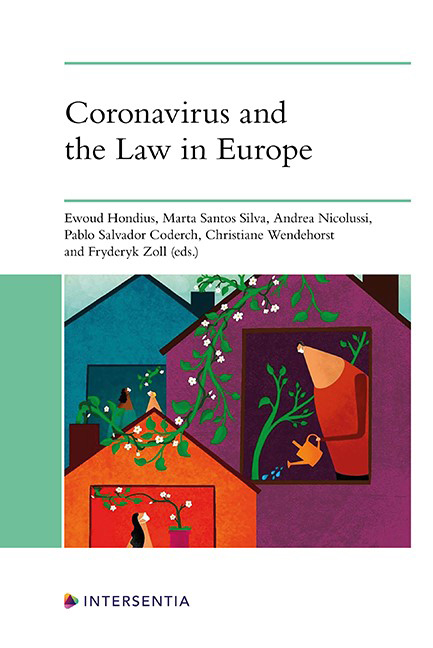Book contents
- Frontmatter
- Preface
- Contents
- List of Keywords
- List of Contributors
- PART I COVID-19 AND FUNDAMENTAL RIGHTS
- PART II STATES AGAINST THE PANDEMIC
- PART III COMPENSATION FOR COVID-19 RELATED DAMAGE
- PART IV CONTRACT LAW
- PART V CONSUMER LAW
- PART VI LABOUR AND SOCIAL LAW
- PART VII CORONAVIRUS CHANGING EUROPE
- Epilogue
- Annex: ELI Principles for the COVID-19 Crisis
- About the Editors
COVID-19 and English Contract Law
Published online by Cambridge University Press: 10 December 2021
- Frontmatter
- Preface
- Contents
- List of Keywords
- List of Contributors
- PART I COVID-19 AND FUNDAMENTAL RIGHTS
- PART II STATES AGAINST THE PANDEMIC
- PART III COMPENSATION FOR COVID-19 RELATED DAMAGE
- PART IV CONTRACT LAW
- PART V CONSUMER LAW
- PART VI LABOUR AND SOCIAL LAW
- PART VII CORONAVIRUS CHANGING EUROPE
- Epilogue
- Annex: ELI Principles for the COVID-19 Crisis
- About the Editors
Summary
The narrow doctrine of frustration in English contract law (under which the parties’ outstanding obligations are discharged automatically) applies only when performance of a contract is impossible because of a change in circumstances. Although much-discussed, “frustration of purpose” applies only when the change has defeated the purpose for both parties and has very seldom been applied. Pre-COVID-19 law contains a few exceptions, but mostly for consumer contracts. The measures taken to relieve parties affected by COVID-19 do not involve any significant changes to contract law. Changes relevant to contracts involve delaying enforcement procedures or changes to the Financial Conduct Authority’s regulatory requirements to provide for “payment holidays” for consumer credit or other financial services. Limited changes to contract law may emerge, but no significant permanent changes.
INTRODUCTION
In this contribution, we explore the ways in which the impact of COVID-19 on the performance of contracts would be dealt with in English law. Our aim is to provide both academic analysis and an idea of the way one common law system is (or is not) coping. We consider existing doctrine and the new legislation which has been introduced in response to the crisis and which impacts directly on contract law and the terms of existing contracts. In addition, we consider other changes which have direct impact on contracts – for example, changes to practice directions that restrict procedures that the other party may apply and changes in other forms of regulation, particularly in the requirements of the Financial Conduct Authority. Changes that have only an indirect effect on the performance of contracts, such as changes in the welfare system, are mentioned briefly.
Our analysis will concentrate on contracts between businesses and consumers (B2C) and between businesses (B2B), but we will refer briefly also to employment contracts (E2E) and to contracts between parties neither of whom is acting in the course of a business (C2C: e.g. private house sales, tenancies with “hobby landlords”). It will also look at contracts of a variety of types: for example, simple contracts for the supply of goods or services; contracts of employment; contracts for housing (both rented and on mortgage); and contracts for other financial services including loans, credit cards, insurance, etc.
First, we will set out the relevant pre-existing rules of English contract law and their potential application to the particular issues associated with COVID-19.
- Type
- Chapter
- Information
- Coronavirus and the Law in Europe , pp. 461 - 490Publisher: IntersentiaPrint publication year: 2021
- 1
- Cited by



